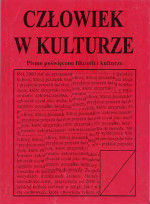
Francis Bacon - a reformer of science?
Franciszek Bacon – reformator nauki?
Keywords: Bacon; science; modernity
More...
Keywords: Bacon; science; modernity
More...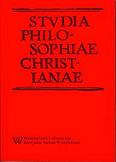
Keywords: ontology; metaphysics; essentialism; existence; possible being; real being
Modern ontology, as a separate philosophical discipline (alongside metaphysics, or rather replacing it), arose on the foundation of late scholasticism and Descartes’ rationalism. The appearance of a new name, at the beginning used interchangeably with “metaphysics”, was not a purely verbal operation. Together with the change of the name, the object, method and purpose of metaphysical knowledge were altered. The article shows the process by which the object of metaphysics, which was really existing being, was replaced with the objective concept, which is a representation of this being, and with internally non-contradictory being. The article also presents the process of eliminating the name “metaphysics” in favour of “ontology”, and of transferral of metaphysical issues to the field of physics.
More...Keywords: Divine knowledge; Freedom of indifference; The best possible world; Second scholastic
The paper deals with three different concepts of Divine knowledge (Dominican’s, Jesuits’, Leibniz’), as well as with the relationships of these doctrines to the problem of self-determination and to the Divine choice of the best possible worlds. Firstly, three different concepts of Divine knowledge are explained and the emphasis is put on the impact of the scholastic’s tradition on Leibniz’s conception of Divine knowledge. Secondly, some relations and links among the three different concepts of Divine knowledge and the doctrine of self-determination are brought to light and evaluated. Thirdly, the author shows how strongly was Leibniz’s concept of the necessitas moralis Dei ad optimum influenced by the the Sevillian Jesuits’ school.
More...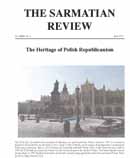
Polish republican thought is virtually unknown in the intellectual world of Western Europe and America. One cannot find any information about Polish political thought, let alone the Polish practice of republicanism in the works of such thinkers as Quentin Skinner or John Pocock—perhaps because its foundational works were written either in Latin or in Old Polish and have never been translated into modern European languages. Political writers began to use Polish in the mid-sixteenth century; before that the vernacular was used only when dealing with minor or inferior matters in the kingdom. The first politcal treatises in the Polish languages were the works of Stanisław Orzechowski (1564) and Marcin Kromer (1551); earlier, Latin was the language in which the Polish gentry (szlachta) expressed their political and sometimes private sentiments. In the sixteenth century Poland was one of the few countries in Europe where Latin was routinely taught in schools so that graduates acquired enough proficiency to communicate with each other in that tongue.
More...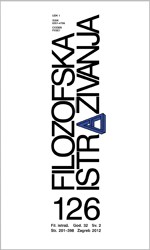
Keywords: res cognita; simple conception; real essence; Meditations; Gottfried Wilhelm Leibniz; Johannes Caterus; Franciscus Suárez
The paper begins with the analysis of Third Meditation, and it is shown that there is no difference between any objects of the representations as such. Descartes’ understanding relies on Late Scholastics concept of simple conception. By the example of two ideas of sun and the idea of self it is shown that Descartes could argue that some ideas certainly do not represent just beings of reason, but that is not enough. Using his other writings the conclusion is that, in fact, there are two problems: how to distinguish between the essences of things from beings of reason and how to make a demarcation within very beings of reason between possible and impossible constructs. In the second part of the paper, Leibniz’s critique of Descartes’ ontological argument is analyzed. The historic cause of the problem is Descartes’ use of mutually irreconcilable concepts of human mind and divine ideas, and the cause within his metaphysics is dualism and his insufficiently clear notion of clarity and distinctness of ideas.
More...Keywords: Clauberg; logic; Descartes; hermeneutics; method; Revius; Lentulus; medicina mentis
Th is article provides an analysis of Johannes Clauberg’s intentions in writing his Logica vetus et nova (1654, 1658). Announced before his adherence to Cartesianism, his Logica was eventually developed in order to provide Cartesian philosophy with a Scholastic form, embodying a complete methodology for the academic disciplines based on Descartes’ rules and a medicina mentis against philosophical prejudices. However, this was not its only function: thanks to the rules for the interpretation of philosophical texts it encompassed, Clauberg’s Logica was meant to provide a general hermeneutics designed to put an end to the quarrels raised by the dissemination of Cartesianism. Such quarrels, according to Clauberg, were caused by the misinterpretation of Descartes’ texts in Revius’ Methodi cartesianae consideratio theologica (1648) and Statera philosophiae cartesianae (1650) and in Lentulus’ Nova Renati Descartes sapientia (1651), which criticized the apparent lack of a logical theory in Descartes’ philosophy and its supposed inconsistencies. Clauberg answers their criticisms by giving a clear account of Descartes’ logical theory and by undermining the interpretative criteria they assumed, in light of a general theory of error. Polemics over Cartesian philosophy, in this way, favored the development of a comprehensive Cartesian methodology for academic disciplines and of the fi rst hermeneutics for philosophical texts.
More...Keywords: Soul; Body; Hylomorphism; Form; Matter; Human nature; Council of Vienne; Thomas Aquinas; Peter Olivi; Duns Scotus; Francisco Suárez
The article raises the question about the content of the Catholic dogma defined at the Council of Vienne stating that the rational human soul is the form of the human body and arrives at the conclusion that there is no single generally accepted meaning in the theological tradition, but rather two radically differing lines of interpretation: a “thomistic” one tending to a more “monistic” interpretation of human nature, and a “reistic” one, resulting in a strongly pronounced dualism. Both of the interpretations are found to be laden with serious difficulties; the author contrasts various aspects of these interpretations, exposing their problems, and finally suggests that further philosophical and theological work is needed to provide an acceptable interpretation of the dogma of Vienne.
More...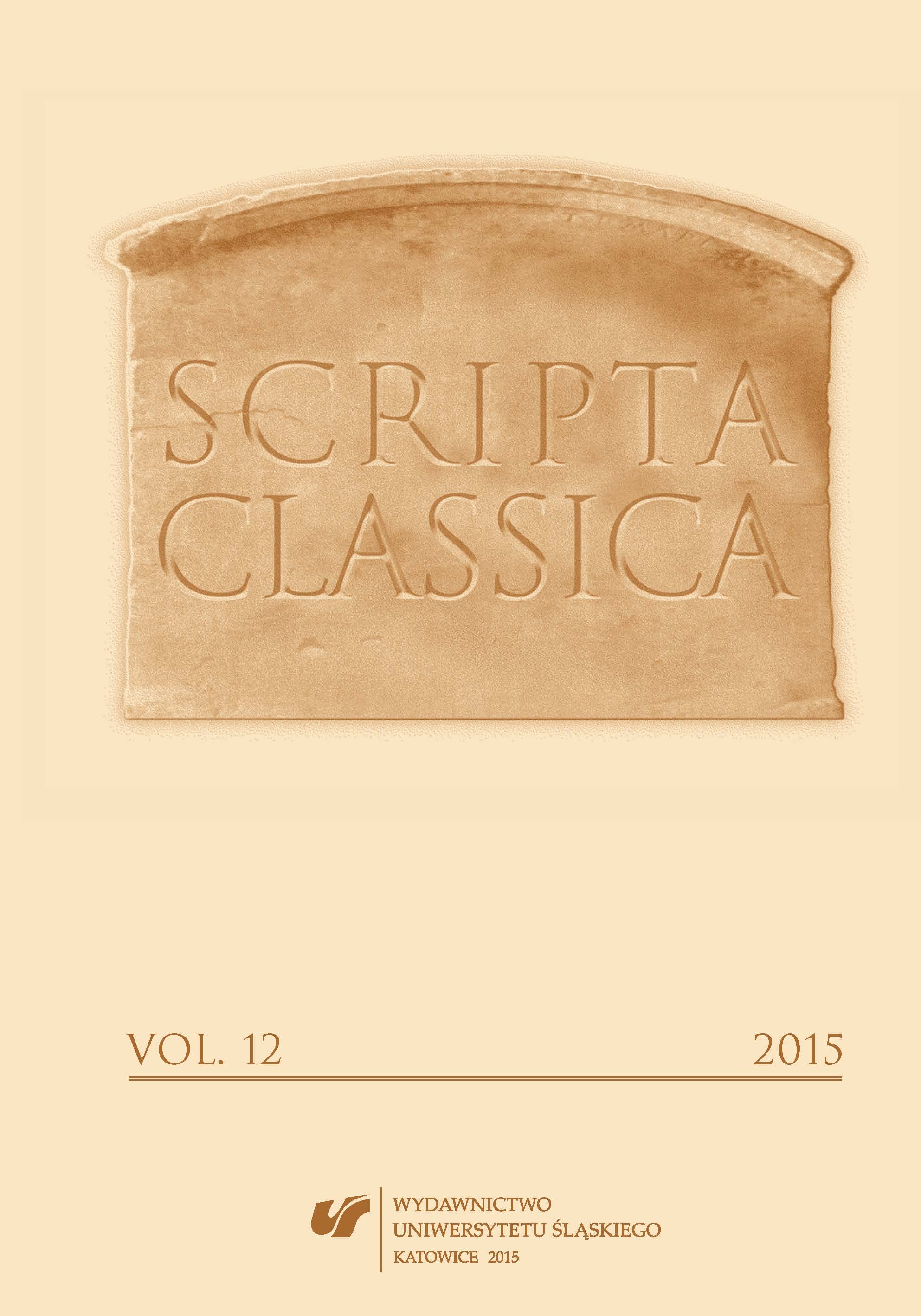
Keywords: philosophy; Lucretius; Cicero; soul; immortality; Epicureans
Cicero’s return to philosophical issues in 46 BC meant also a remarkable change in his preferences concerning philosophy. As in the 50s he was mainly interested in ethical and political problems, now, after a few years, the main subject-matter of his philosophical investigation became the question of the death and immorality of the soul. In the following article I would like to suggest that one of the crucial factors that contributed to this change was the appearance of Lucretius’ “De Rerum Natura” – a splendid exposition of the Epicurean doctrines in the work where the ideas so absurd to Cicero were prompted in his native Latin language. The presence of this poem engaged Cicero in intellectual dispute with Lucretius, but without an open referring to the poet and his masterpiece. This secret rivalry remains for the modern reader somewhat more than a mere literary curiosity. Its importance is twofold: first, to a great degree it contributed to producing by Cicero excellent, inspiring philosophical dialogues; secondly, it reminds of a longtime meditation on the theme that ever will remain the greatest enigma of human life.
More...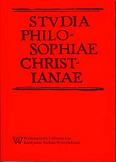
Keywords: martyrdom; suicide; intentional action; absolute moral norms; Popieluszko Jerzy
The article focuses on the difference between murder or suicide and the act of martyrdom. The arguments refer to John Paul II’s teaching on absolute moral norms and John Finnis’ theory of basic human goods. The core of the text is a discussion with the approach of Finnis who claims that a martyr merely accepts her own death as a side-effect of her other intentional action; the discussion is based on Aquinas’s insights (mainly in "Summa theologiae") and aims to show that death is not merely an accepted side−effect, but somehow enters into the specification of the act of martyrdom. The general conclusion is that the difference between martyrdom and suicide or murder requires a refined theory of intentional action, as opposed to non−intentional effecting of something, and also, above all, calls for still more diligent study of what exactly the prime and proper objects of practical reason, of proposal, of choice and of action itself are.
More...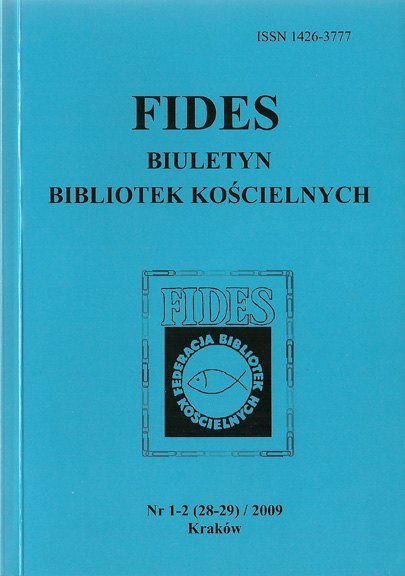
Zabytkowe, bogate lub też ubogie formą książki są owocem wspólnego wysiłku ludzi różnych zawodów – drukarzy, rytowników i oczywiście introligatorów. Twórcy ci nadawali swym dziełom oryginalny charakter zależny oczywiście od swego poziomu fachowego wykształcenia, wrażliwości artystycznej i dokładności wykonania. Dziś, po wielu latach od momentu wytworzenia zabytkowych ksiąg nie zawsze możemy docenić ich wszystkie walory często bowiem ich historia była burzliwa i przyczyniła się do dalekiej zmiany formy wskutek uszkodzeń, a także ingerencji związanych z ich naprawami.
More...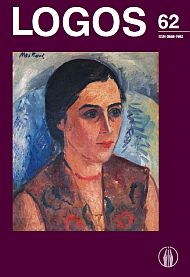
Keywords: Heidegger; Thomas Aquinas; Suárez; ontology; essentia-existentia; Dasein productive behaviour;
The article provides a detailed analysis of the portion of Heidegger’s lecture cycle The Basic Problems of Phenomenology (1927) that is dedicated to medieval ontology. In his approach to three authors – Thomas Aquinas, Duns Scotus and Suárez – Heidegger interprets this ontology as a logical extension of the Greek metaphysics of being (Plato, Aristotle) and so merely exemplifying the global ‘fall’ of Western thought. The thinking of the German philosopher is concentrated around the famous essentia-existentia disjunction, the scrutiny of which explains all the basic concepts of medieval metaphysics. Such an explanation enables Heidegger to insert Scholastic ontology into his existential analytic and understand the former as the expression of productive behaviour of Dasein (being-here) – all of which qualifies medieval philosophy as inconsistent as regards the inquiry of being. The present article, however, points out some important weaknesses in Heidegger’s interpretation: the philosopher failed to understand the originality in Thomas Aquinas’ metaphysical thought, which derives from actus essendi, the core concept of the latter. The article is brought to conclusion with the definition of a potential interface between the philosophies of Thomas Aquinas and Heidegger, embracing the concepts of being and time.
More...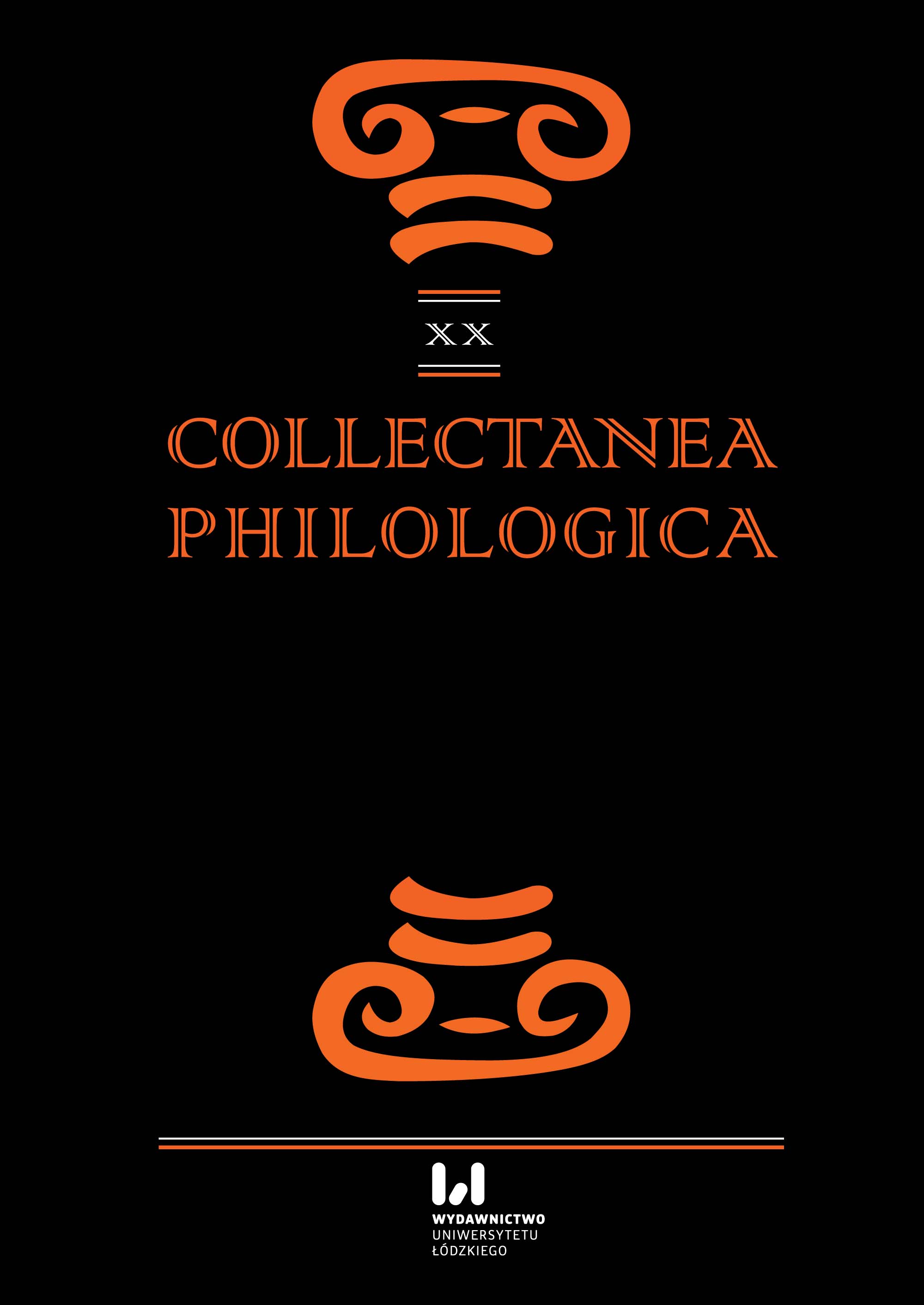
Keywords: Cicero; rationality; Stoics; animals; reasonableness
Having analysed Cicero’s opinions about wild animals demonstrated in some of his works (De finibus bonorum et malorum; De natura deorum; Tusculanae disputationes), we may conclude that on the one hand a human as a rational being is definitely opposed to other living creatures that just follow their carnal instincts, on the other hand even among representatives of various species of animals one can observe behaviour to some extent rational, or even “ethical”, that make them similar to human beings. We may explain this phenomenon with the concept based on the Stoic doctrine of rational or even somehow divine character of nature that contains in itself elements of gradation, and allows the presence of divine ratio in particular beings to differ in intensity, what locates animals in the hierarchy of beings slightly lower than the humans.
More...Keywords: material substance; matter; form; reification; substantial unity;
In this paper I present Suárez’s conception on material substance in connection with two main aspects of his theory. The first aspect is “reification” of the intrinsic principles of a composite, which has led some interpreters to the claim that Suárez significantly prepared the way for the accession of Cartesian anthropological dualism. The second one is Suárez’s emphasis on the substantial unity of material composites. The analysis of the second aspect is conceived as a counterbalance to some uncharitable interpretations of Suárez’s hylemorphism. In the second part of the paper the relevance of Suárez’s arguments to contemporary debates on the ontological constitution of individuals is presented.
More...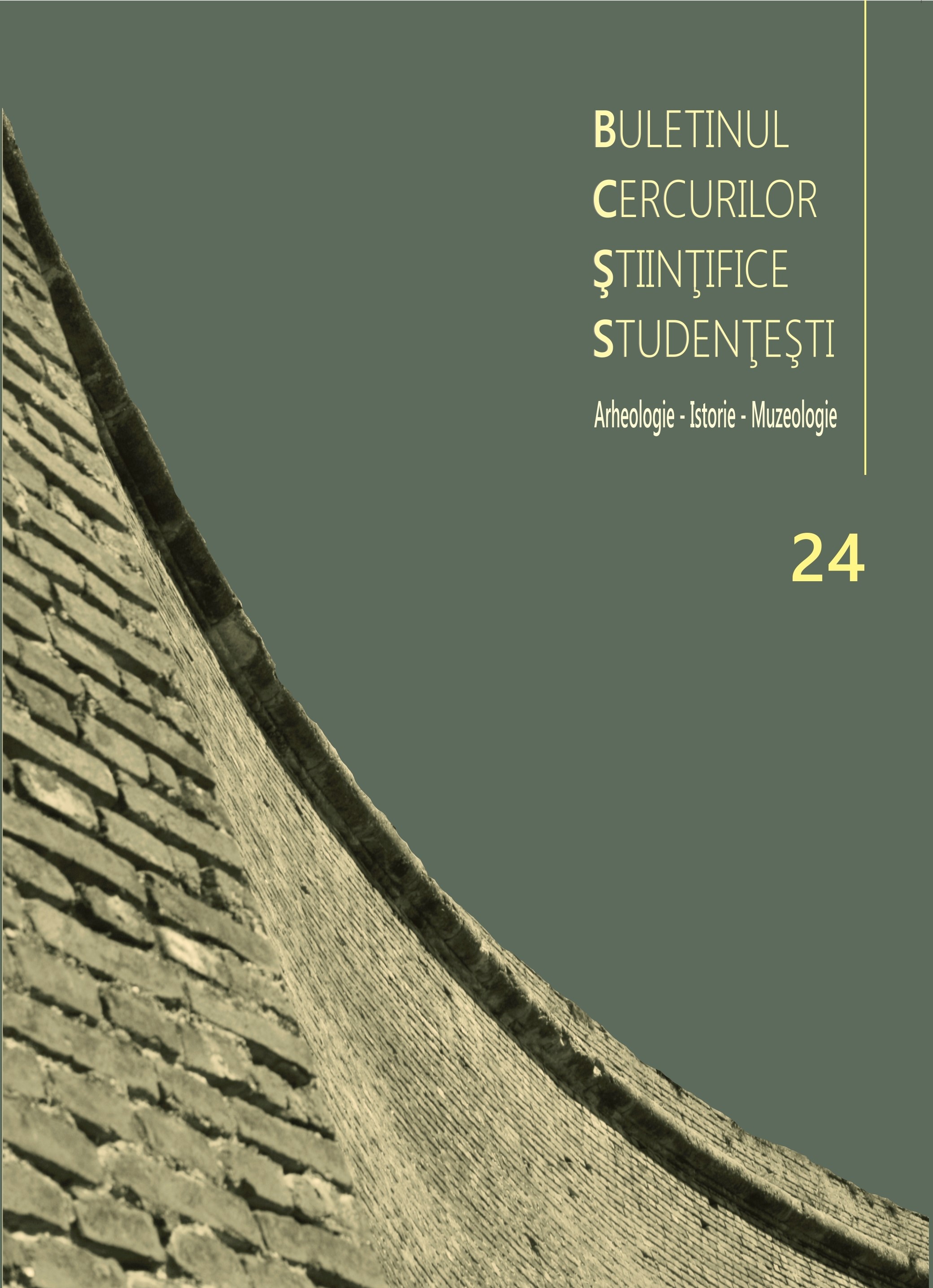
Keywords: Archaeology of death; Romans; childhood; Histria;
This paper aims to discuss attitudes towards infant death manifested in the funerary treatments and practices applied to the youngest members of the Roman society from the ancient city of Histria. We have at least two lines of evidence we can work with in order to do this: on the one hand there are literary sources, which suggestan image of the child as a peripheral element, a social depreciation reflected as such in the funerary treatment; on the other, there are archaeological sources that support a different interpretation. The comparative analysis of funerary practices from the graves of children and those of adults at Histria is mainly based on the American anthropologist Joseph Tainter's approach regarding the relationship between social status and energy expenditure. The main argument of the articleis that there is no exclusion in terms of funerary treatment between the graves of adults and those of children, whichis at variance with the discourse suggested by written sources.
More...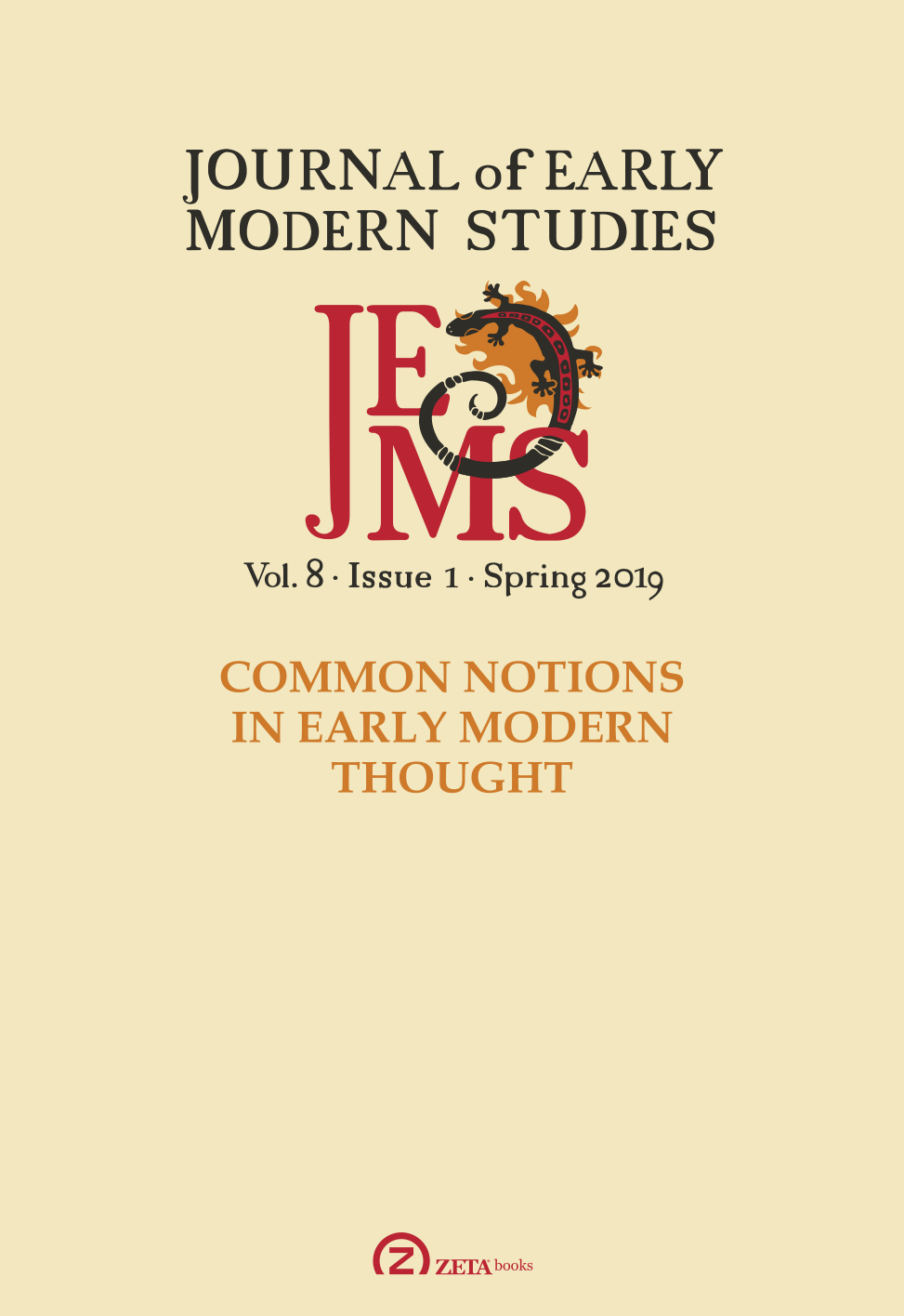
Keywords: innate ideas; innate principles; a priori knowledge; Stoicism; Epicureanism; Platonism;
The theory of notitiae naturales or κοιναὶ ἔννοιαι was part of the ancient Stoic epistemology. It served as precondition of any knowledge. Within the framework of the humanist rediscovery of ancient sources this theory became an important aspect of Philipp Melanchthon’s theological anthropology. This paper examines the polyvalent perspectives of the theory of notitiae naturales in Melanchthon’s philosophy and the role it played among Lutheran and Calvinist scholars, particularly regarding Rom 1: 19, where Paul stated some kind of a natural knowledge of God. The idea of notitiae communes or “common notions” as an a priori precondition of knowledge was widely spread both on the continent and in England in early modernity. It came to an end by John Locke’s critique in his Essay Concerning Human Understanding.
More...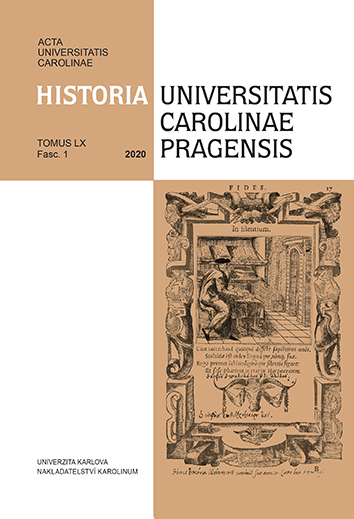
Keywords: academic exercises; axioms; commonplaces; commentaries; disputations; editions; encyclopedias; lectures; lexicons; pedagogy; textbooks; translations
The submitted study deals with various types of works written by 16th- and 17th-century Central European philosophy professors. Their intensive production is examined with the use of the following nine categories: 1. lectures, 2. disputations, 3. academic exercises, 4. polemical writings, 5. translations, 6. editions of ancient and post-ancient writings, 7. monographs, including commentaries, 8. auxiliary writings, and 9. other kinds of writings. These categories form the basis of further content analysis.
More...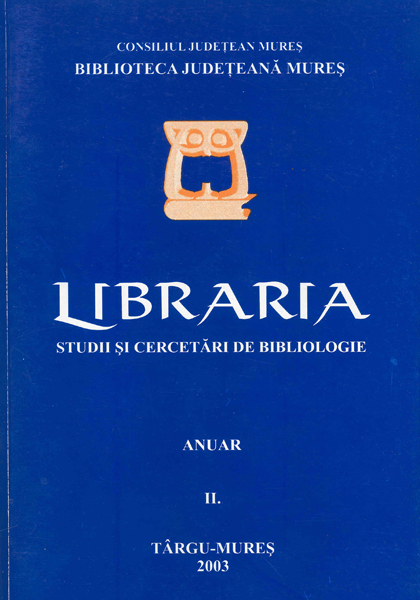
Keywords: Libraria; Biblioteca Județeană Mureș; biblioteconomie; bibliologie; carte veche; carte bibliofilă; istorie locală; servicii de bibliotecă; Biblioteca Teleki; carte veche românească;
Les éditions de l’oeuvre écrit par l’historien et politicien roumain Marcus Tullius Cicero (106-43 a.Chr.) gardées dans les collections du Fond Teleki-Bolyai de la Bibliothèque Départementale de Mureş, constituent l’objet de cette présentation. Le nombre des oeuvres du grand orateur Cicéro qu’on trouvent dans notre bibliothèque est très grand: 97 éditions en 130 volumes, dans la collection Telekiana, 48 éditions en 83 volumes dans la collection Bolyai et 42 éditions en 61 volumes dans la collection „mixte”, la limite chronologique conventionnellement établie étant celle de l’année 1800. Le grand nombre des éditions ne nous permet pas une „restitutio ad integrum”, mais on peut faire une présentation de quelques éditions considerées rares et de grande valeur. On en a remmarqué quatre incunables et quelques oeuvres imprimés au XVI-ème siècle. Par les notes manuscrites sur les exemplaires bibliophiles on peut constater la réception de la culture classique dans la société transilvaine des siècles 16 et 20-e, les liens permanents et actifs des intellectuelsautochtones et de ceux-ci avec les intellectuels étrangers.
More...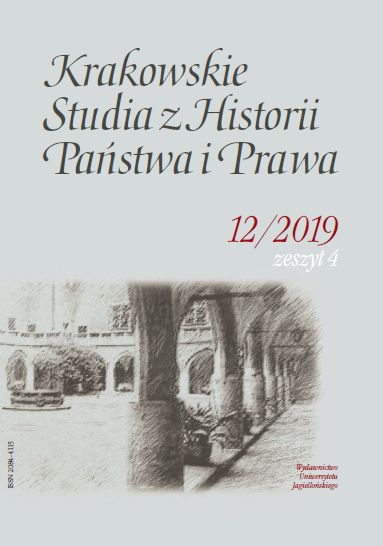
Keywords: disease; illness; latent defects; history of veterinary law; choroba; wady ukryte; historia prawa weterynaryjnego
The aim of the study is to reveal the connections and inspirations between Roman and contemporary regulations of warranty, as an element of European heritage. The material for the study consists of Justinian’s “Digest”, Gellius’and Cato’s works, contemporary Polish warranty legislation –the Civil Code, its amendments and executive acts. Juridical, medical and philosophical views of ancient Roman lawyers on animal health in the mentioned material were examined and analyzed. The views of the ancient Romans reflected in Polish civil law were pointed out. Studies have been carried out, comparing the ideas that provide the background for legal norms of warranty. It has been proved how different defining of health and disease in veterinary medicine can affect divergent legal regulations in relation to animals sold. The functionality criterion was affirmed to be applicable not only as one of warranty premises, but also as a motor for legal development.
More...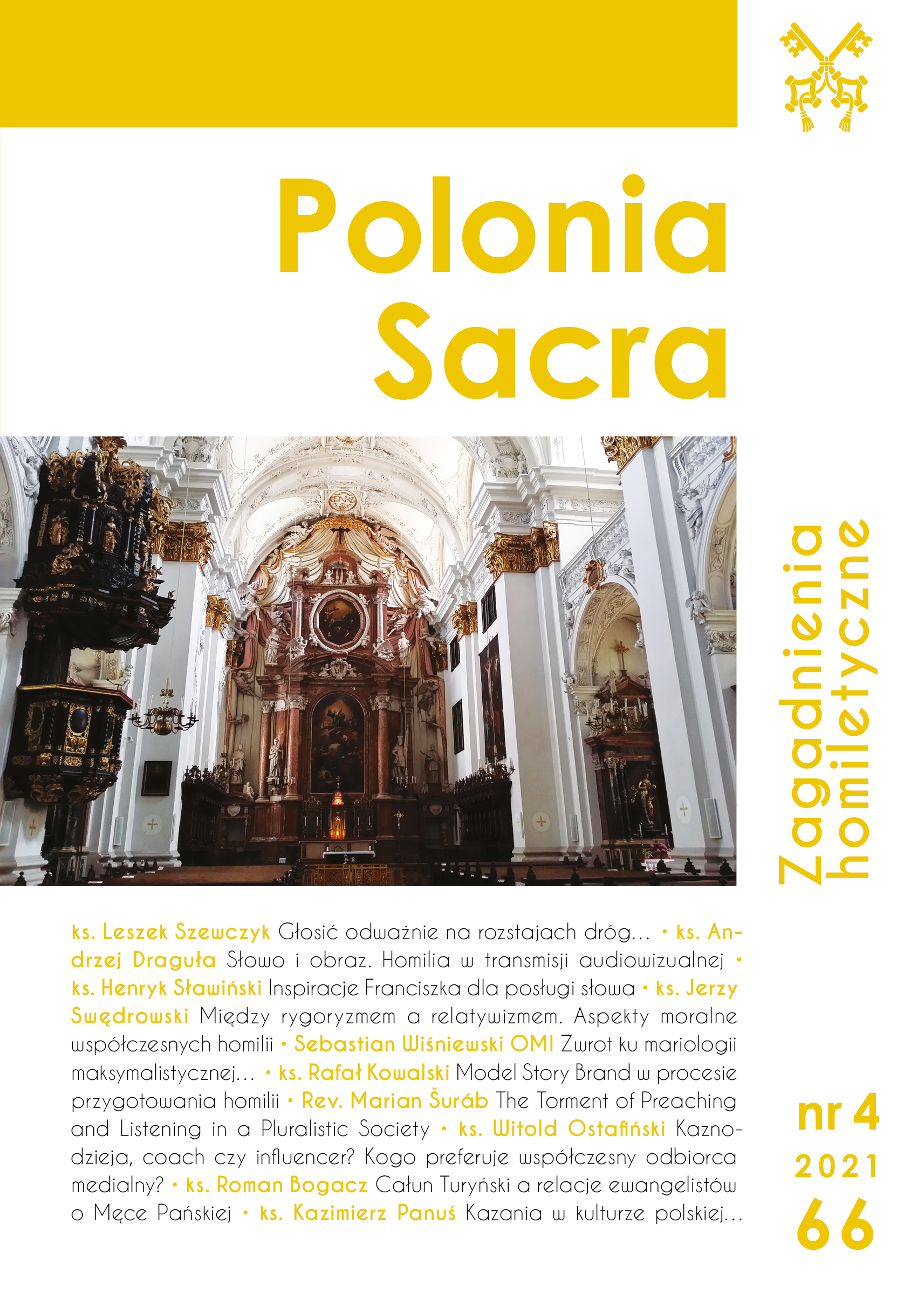
Keywords: homily; preaching; suffering; laity
The homily is an act of communication that consists of three elements: the preacher, the listener, and the homily. The purpose of homilies is to update the message of salvation and encourage the faithful to live the gospel. The homily as communication should take place in a peaceful environment. If this is not the case, preaching and listening may result in suffering. The paper mentions several reasons why this happens. The preacher may suffer from a new cultural and religious circumstance, authority issues, impaired spirituality, personal difficulties, loss of enthusiasm and fear or excessive stage fright. For listeners, the torment of listening may be caused by unfulfilled expectations, a bad relationship with the preacher, or homilies that lack simplicity, are full of abstract sentences, are long or unprepared.
More...![Suárez and the Analogy in the Light of the New Research (rev.: Kazimierz Gryżenia SDB. Analogia w scholastyce nowożytnej. Studium z metafizyki Franciszka Suáreza [Analogy in Modern Scholastics: A Study of Francisco Suárez Metaphysics])](/api/image/getissuecoverimage?id=picture_2021_65942.jpg)